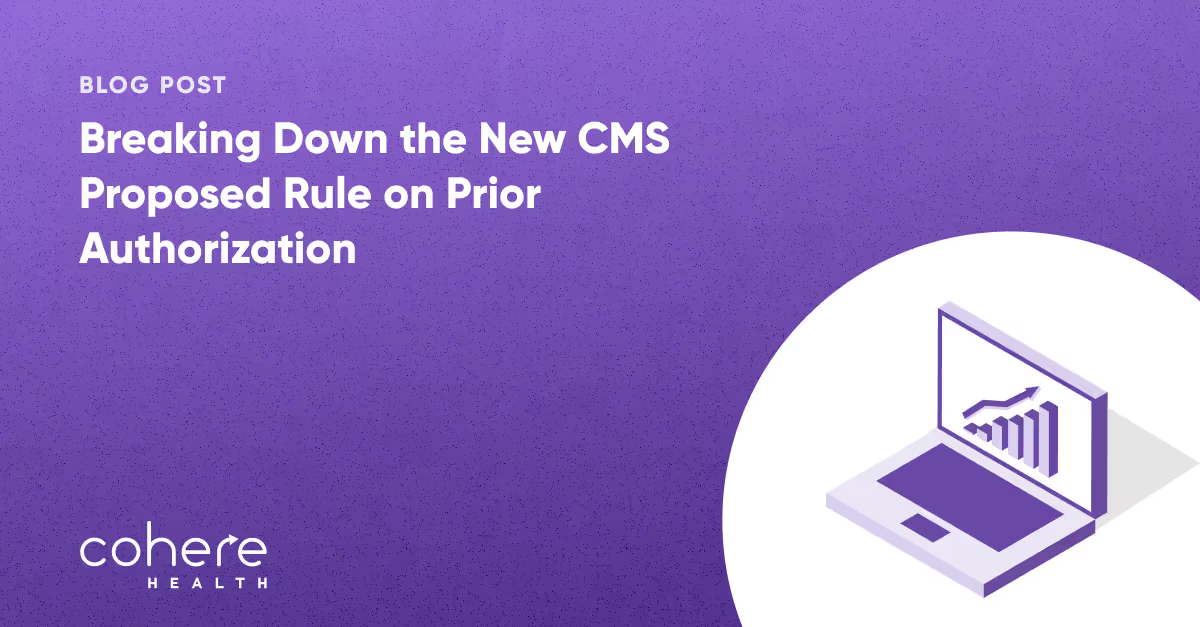Four Things You Need to Know About the CMS Medicare Advantage Rule
Published:
April 27, 2023

Regulatory compliance with CMS’s Medicare Advantage and Part D Final Rule required by January 2024
Earlier this month, the Centers for Medicare and Medicaid (CMS) issued a final rule revising Medicare Advantage (MA), Medicare Part D, Medicare Cost Plan, and Programs of All-Inclusive Care for the Elderly (PACE). The rule includes provisions for enhancing MA and Medicare Part D, ensuring timely access to care, protecting beneficiaries, strengthening quality, advancing health equity, and improving behavioral health. The implementation deadline for all of these changes, including utilization management requirements to ensure timely access to care, is January 1, 2024.
This final rule mandates requirements that are incremental to the changes likely to be finalized in the Advancing Interoperability and Improving Prior Authorization Processes Proposed Rule (CMS-0057-P). So while plans will likely have until January 2026 to implement these large scale changes, compliance with this new rule will help drive incentive and momentum.
The utilization management requirements of CMS’s MA and Part D Final Rule emphasize timely access to care
In general, Cohere applauds the agency for clarifying delivery system standards for prior authorization notification. The agency’s recent efforts to modernize and standardize prior authorization requirements will help to improve patient outcomes and reduce delays in care, promote health equity among Medicare beneficiaries, and ensure physicians and health plans perform prior authorization with automation and transparency.
To help your plan strategize for implementation, here are the four key utilization management provisions in the final rule, and how Cohere can help your plan comply:
1. MA plans must follow traditional Medicare coverage NCDs, LCDs, statutes and regulations when making medical necessity determination.
What’s different: Originally, health plans had more control over utilization by reserving the freedom to follow guidelines that consolidated clinical data, medical literature, and CMS guidelines.
How Cohere can help: Cohere is already using National Coverage Determinations (NCDs) and Local Coverage Determinations (LCDs) today and our prior authorization solution is content-agnostic. We already embed NCDs and LCDs for certain specialty services and can easily add for others.
By disallowing the use of proprietary guidelines as the single source of truth, CMS is increasing transparency around prior authorization requirements and encouraging innovation around alternative ways to control medical expense outside of prior authorization denials. For example, Cohere has reduced low-value utilization by up to 15% using pre-submission influence technology, like nudges.
2. MA organizations must create and make publicly accessible internal coverage criteria based on current evidence in widely used treatment guidelines or clinical literature when coverage criteria are not fully established in the applicable Medicare statute, regulation, NCD or LCD.
What’s different: Plans will now need to post coverage criteria used to make medical necessity decisions.
How Cohere can help: Cohere’s mission, to ensure all patients receive high-quality care that is evidence-based and appropriate, is underscored by our specialty care management programs whose guidelines were developed in partnership with leading specialty societies, such as the American Academy of Orthopedic Surgeons (AAOS) and the American College of Cardiology (ACC). We make these guidelines transparent as part of our prior authorization processes.

3. An approval granted through prior authorization processes must be valid for as long as medically necessary to avoid disruptions in care, in accordance with applicable coverage criteria, the patient’s medical history, and the treating provider’s recommendation.
What’s different: Plans are now required to honor authorization approvals to facilitate access to care, particularly in cases where an enrollee currently undergoing treatment switches to a new MA plan, switches from traditional Medicare to an MA plan, or is new to Medicare, by honoring a minimum 90-day transition period.
How Cohere can help: Our products have eligibility checks, ingest patient medical history, and can ensure continuity of care to help health plans comply with this provision.
4. MA organizations must establish a committee, led by a plan’s medical director, that reviews utilization management (including prior authorization) policies annually and keeps current on LCDs, NCDs, and other traditional Medicare coverage policies.
What’s different: MA organizations will need to establish and/or formalize prior authorization policy review committees.
How Cohere can help: Cohere can likely be helpful to our clients in their annual review of prior authorization policies, a process we currently conduct internally.
Health plans must act immediately to implement the provisions included in the CMS Medicare Advantage and Part D Final Rule. Cohere Health is eager to partner with plans to strategize around compliance to the new requirements for utilization management. Any new initiatives on this front will likely help plans’ larger regulatory compliance strategies for upcoming CMS rules and state legislation. Intelligent prior authorization solutions enable regulatory compliance with utilization management provisions and drive:
- Improved patient outcomes
- Reduced delays in care
- Promotion of health equity among Medicare beneficiaries
- Increased transparency for physicians and health plans
Read our white paper, The Tech-Powered Shift from Transactional to Transformational Prior Authorization, for more information.
For further information about current state and federal regulations affecting prior authorization and utilization management, visit our Compliance Academy.
Available For Download
Stay ahead with expert insights on transforming utilization management and payment integrity—delivered straight to your inbox.




